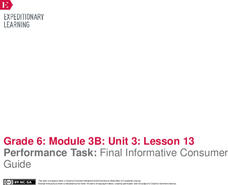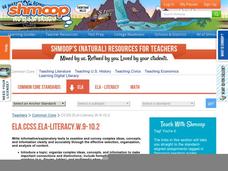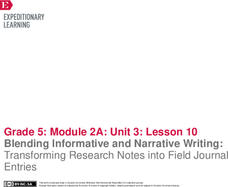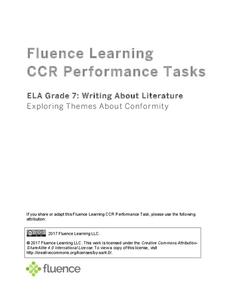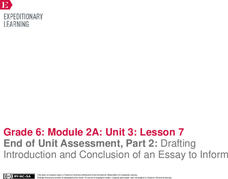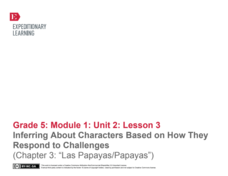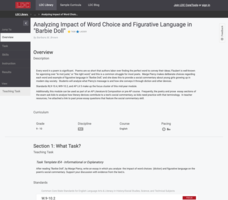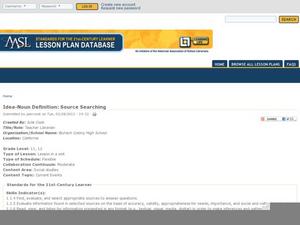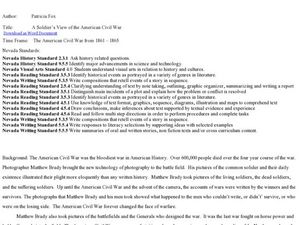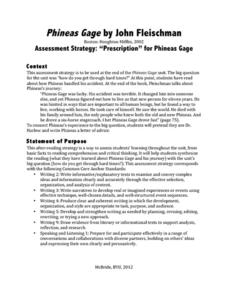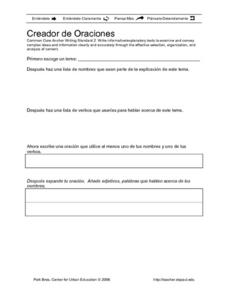EngageNY
Analyzing Point of View: Inferring about the Natural Disaster in Eight Days
Who is telling the story? Readers take a look at the text Eight Days to determine if the story is told in first or third person. They then discuss in groups and complete a shared writing activity to describe how the narrator's point of...
Channel Islands Film
Santa Cruz Island - Writing for Information
After re-viewing a documentary segment on the restoration of Santa Cruz Island,, individuals craft an essay in which they compare the views of the various stake holders featured in the video and identify the point of view they find the...
EngageNY
Performance Task: Final Informative Consumer Guide
Formative feedback should be kind, specific, and helpful. Pupils engage in a peer editing process, using a rubric to critique a partner's writing. Next, scholars use the feedback to create the final version of their informative consumer...
Curated OER
K-W-L Chart
After choosing a topic of interest, young learners use the K-W-L thinking process to create an informational, illustrated, big book. K-W-L, a three-part thinking process, asks the learner to respond to three questions: What do we know...
Odell Education
Reading Closely for Textual Details: Grade 12
Help your class examine humanity's unpredictable nature through "Life Steps Almost Straight." Learners read various works from philosophers such as Viktor Frankl, The Buddha, and Nietzsche to gather textual evidence and explain their...
Shmoop
ELA.CCSS.ELA-Literacy.W.9-10.2
The details in the new Common Core standard for producing informative/explanatory texts is different from what you have in your current curriculum, and now you are confused on what to do. Keep calm and carry on, because not only does...
Fluence Learning
Writing About Literature: Comparing and Contrasting Characters in Heidi
Scholars read excerpts from the story, Heidi, in a three-part assessment that focuses on comparing and contrasting characters. Each part contains three tasks that challenge learners to discuss, answer comprehension questions,...
EngageNY
Blending Informative and Narrative Writing: Transforming Research Notes into Field Journal Entries
The fabulous four. Scholars learn the four key components for creating an excellent journal entry. They then work to create a journal entry rubric and participate in a mini lesson about organizing and outlining journal entries.
Fluence Learning
Writing About Literature: Exploring Themes About Conformity
Feeling the pressure to confirm is something any adolescent can relate to. Explore an essential theme with a response to literature assessment that prompts learners to identify main ideas with evidence and supporting details.
Channel Islands Film
Lone Woman of San Nicolas Island: Lesson Plan 1
As a practice writing test, fourth graders use the West of the West's documentary Lone Woman of San Nicolas Island and two print resources as source materials for an informative article that identifies information that is historically...
EngageNY
End of Unit Assessment, Part 2: Drafting Introduction and Conclusion of an Essay to Inform
A powerful introduction and conclusion can really pack a punch. Using the resource, scholars first read and discuss a model essay. Then, as part of the end of unit assessment, they draft the introductory and concluding paragraphs of...
EngageNY
Inferring About Characters Based on How They Respond to Challenges (Chapter 3: "Las Papayas/Papayas")
Start off your day with a quick reading comprehension quiz about chapter three of Esperanza Rising by Pam Muñoz Ryan. After they complete the quiz, pupils participate in a discussion and look closely at the text. A strong Common Core...
Literacy Design Collaborative
Analyzing Impact of Word Choice and Figurative Language in "Barbie Doll"
After a close reading Marge Piercy's poem "Barbie Doll," class members craft an AP®-style explanatory essay in which they analyze the diction and other figurative literary devices the poet employs to deliver her commentary on modern...
New York City Department of Education
What Did I Do to Be so Black and Blue: How Did Jazz Influence Ralph Ellison's Invisible Man
How did jazz influence Ralph Ellison's Invisible Man? Class members read some of Ellison's non-fiction writings about blues and jazz, listen to records, watch videos, and engage in student-centered discussions. They then produce podcasts...
Curated OER
Explanation
Walk your class through the process of writing an explanation using this resource. Learners often have to write a how-to explanation for such simple tasks as making a peanut butter sandwich. This presentation identifies key components of...
Curated OER
Idea-Noun Definition: Source Searching
A great idea for showing language arts pupils the universality of themes, even in the real world! Have class members choose an idea-noun (peace, justice, war, love, etc.) at the beginning of the year or semester. They complete weekly...
EngageNY
Inferring About Characters Based on How They Respond to Challenges (Chapter 4: "Los Higos/Figs")
How do you know what a character's personality is like if an author doesn't tell you? With a focus on character development in Esperanza Rising, pupils complete a jigsaw activity to analyze the actions of Mama, Abuelita, and Miguel. Once...
EngageNY
Informative Paragraph Pre-Assessment: What Is One Reason You Want the Power of Reading?
This writing pre-assessment has minimal instruction but maximum support and encouragement. It begins with a review of the book, Rain School, through a think-pair-share and small group discussion. The discussion focuses on the idea that...
Curated OER
A Soldier's View of the American Civil War
Study and research the American Civil War in this explanatory writing lesson. Middle schoolers complete six activities to learn about the American Civil War and soldiers' views of the war. The lesson includes several options to complete...
Curated OER
Phineas Gage: Assessment Strategy
Close up your study of Phineas Gage: A Gruesome but True Story About Brain Science with a letter-writing assignment. Pupils prepare by journaling and sharing with a partner. They then compose letters that focus on a big idea from the...
EngageNY
Drafting Body Paragraphs
That's just the style. Learners begin with a mini-instructional activity about formal writing style. They then use what they learned about formal writing to begin the body paragraphs for their End of Unit 1 Assessment Prompt: Adversity...
EngageNY
End of Unit Assessment: Final Essay
This is just the transition phase. Scholars participate in a mini lesson about using transitions in writing. They then have a brief peer critique of the introduction and conclusion paragraphs for their end of unit assessment. Learners...
Curated OER
Creador de Oraciones
Start by selecting a topic. What do you want your class to learn more about? Then, distribute this helpful note-taking guide. They record their topic, a list of names that could be associated with it, a list of verbs that come up when...
Curated OER
Is That a Fact?
Investigate popular scientific claims and gather evidence to defend or argue against an author's stance. Writers synthesize information and compose their own "Really?" columns modeled after those found in the weekly "Science Times"...




